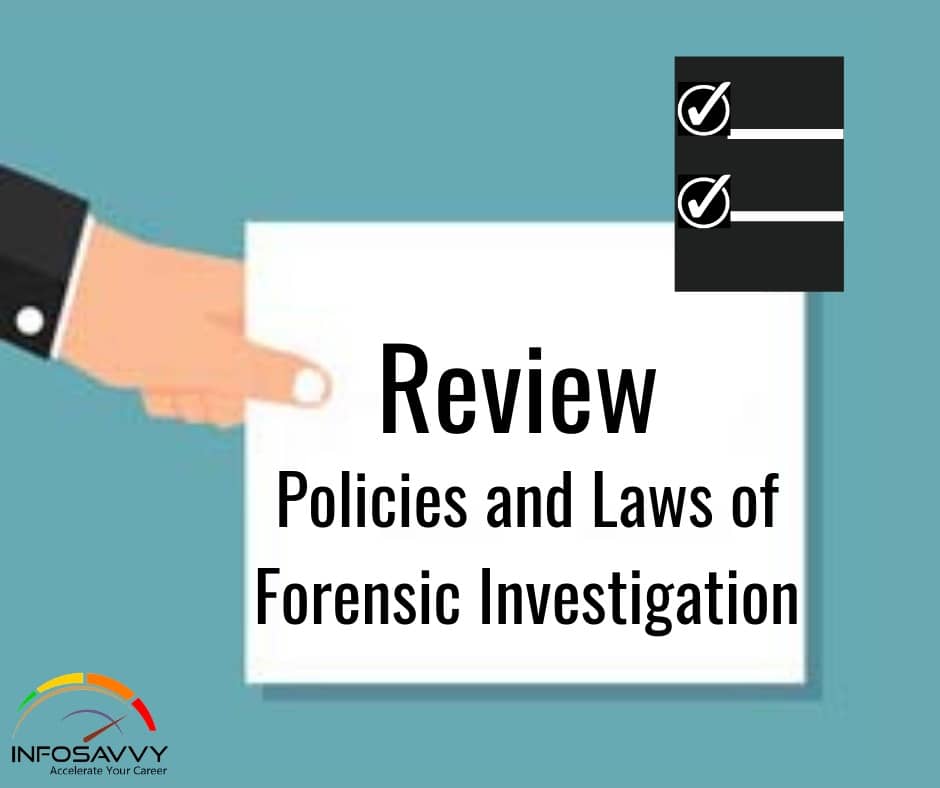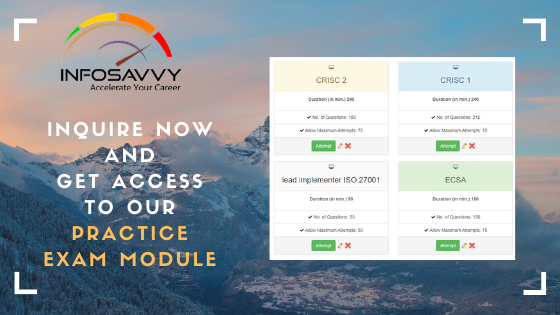Review Policies and Laws of Forensic Investigation it is essential to be aware of the laws that will be applicable to the investigation, including the organization’s internal policies, before starting the investigation process.
Identify possible concerns related to applicable federal statutes, state statutes, and local policies and laws. Applicable federal statutes include the Electronic Communications Privacy Act of 1986 (ECPA) and the Cable Communications Policy Act (CCPA), both as amended by the USA PATRIOT ACT of 2001, and/or the Privacy Protection Act of 1980 (PPA).
The best practices in reviewing policies and laws include:
- Determine the extent of the authority to search: As the incident can relate to any confidential information, it is necessary to determine the limits/extent of the authority to search for evidence by an investigation team.
- Determine the legal authorities that perform an investigation: Establishing policies and procedures that address the privacy rights of the employees, contractors, or any other personnel for determining the legal authorities is necessary.
- Consult with a legal advisor for the issues arising because of any improper handling of the investigation: Not all the actions performed during the investigation may be Sometimes the handling of evidence is improper. In this situation, it is essential to consult a legal advisor.
- Ensure the customer’s privacy and confidentiality: Organizations need to check or develop policies that ensure the customer’s privacy and confidentiality.
Related Product : Computer Hacking Forensic Investigator
Establish Quality Assurance Processes
An investigator implements various tools and techniques to retrieve and analyze data of evidentiary value. However, the standalone procedures may affect the resultant evidence and the case outcome. Thus, there is a need for the forensic unit to establish and follow a well-documented systematic process for investigating a case that ensures quality assurance.
Computer forensics investigation can be effective only when the investigators follow certain standard quality assurance procedures. Frame a standard policy for forensics investigation and strictly implement it before starting the case analysis. With the quality assurance policies in place, the investigators can obtain accurate analysis results and help in solving the case. Therefore, the computer forensics departments must formulate a systematic quality management system to ensure accurate analysis results.
Following a systematic process also acts as a proof that the investigation firm follows best practices and procedures leading to a reliable result. Addressing the following topics and reporting it in a Quality Assurance Manual can demonstrate that Quality Assurance Practices are in place.
If you are interested to learn in detail Computer Hacking Forensic Investigator then take training from best institute in mumbai.
Also Read : Build the Investigation Team
Quality Assurance Practices in Digital Forensics
Quality assurance practices play a vital role in ensuring the overall quality of services that a forensic unit offers.
Some of the quality assurance practices:
- Tools meant for the forensic examination process must undergo validity testing to check its purpose of design and accuracy of results. In addition, the test conducted must be documented in detail to enable reproduction of the results.
- The forensic unit must review and update its quality management system at least once in 3 years to ensure that the system meets the quality needs of the unit.
- The forensic laboratory unit must have a documented Quality Assurance Manual (AM) and a Quality Manager (QM), who is responsible for all the quality assurance related issues and developments.
- Investigative reports must undergo administrative review for consistency with forensic unit policies and for report accuracy.
- The final computer forensic reports must be technically reviewed by another forensic examiner prior to publishing, to ensure that:
- The report is concise, clear, and understandable.
- The tools and techniques used in the process were sufficiently documented and forensically sound.
- The technical report, accompanying the executive summary report, should contain in-depth details of the complete investigation process so that another investigation of the evidence leads to the same result.
Quality Assurance Practices: Laboratory Software and Hardware
Quality assurance also includes the practice of checking, repairing and maintaining the resources required to perform the assigned task. In case of forensics investigation, these resources include the software and hardware tools used during the investigation process. The practice that ensures the best outcome from such resources includes:
- Tools, be it a hardware or software require testing to check if they meet the purpose of design
- Validate every hardware or software tool prior to using them on an actual case to ensure if it works correctly, is trustworthy, and yields precise results
- All the software tools (ranging from the operating systems to applications) in the forensic laboratory must have licensed versions and be legal to use
- Updating tools to their latest version, testing them for functionality, and validating ismandatory and should be an ongoing process
- Hardware instruments must be in a working condition and maintained properly
- Investigators need to document the test methodology, results, and theory about the test design while testing the tools
- Integrate maintaining, auditing, documenting, and demonstrating license compliance into the laboratory standard operating procedure (SOP)
- Tool testing procedures must follow certain standards and policies
- NIT has launched the Computer Forensic Tool Testing Project (CFTT), which establishes a “methodology for testing computer forensic software tools by develop.
Questions related to this topic
- What is quality assurance tools?
- What are the categories of computer security?
- What are the fundamental requirements addressed by computer security?
- How do you ensure software quality?
- Explain Review Policies and Laws of Forensic Investigation?
This Blog Article is posted by
Infosavvy, 2nd Floor, Sai Niketan, Chandavalkar Road Opp. Gora Gandhi Hotel, Above Jumbo King, beside Speakwell Institute, Borivali West, Mumbai, Maharashtra 400092
Contact us – www.info-savvy.com




This blog is magnificent i love reading your articles.
Stay up the good work! You understand, many individuals are searching round for this info, you could
aid them greatly.